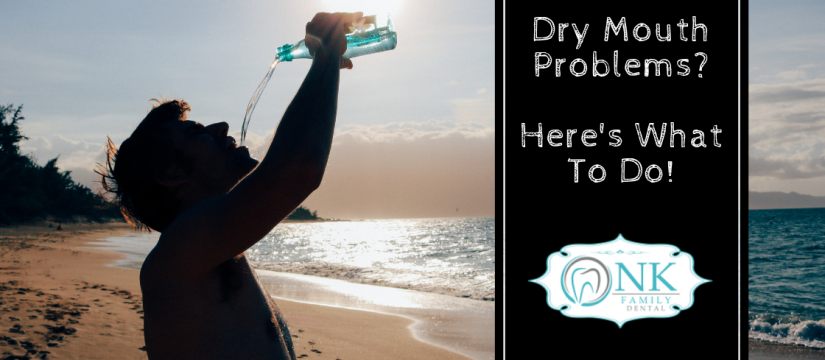
While it may seem to be a relatively minor problem, dry mouth is a common condition that is frequently overlooked, yet can be a potentially serious concern. The American Dental Association estimates that it affects up to 65 percent of the population ‒ while many cases are unreported. Dry mouth not only impacts your oral health, but your ability to chew food, quality of life, and overall well-being. Learn what dry mouth is, what causes it and how it can be treated.
What is Dry Mouth?
Known as xerostomia, dry mouth occurs when you do not have enough saliva to keep your mouth wet and moisturized. Dry mouth is not always serious, but when it is chronic, this condition can be uncomfortable. It may also lead to other health problems, as saliva contributes to the breakdown of food, protects teeth from decay, prevents infection by controlling bacteria in the mouth, and makes it possible for you to chew and swallow. Such issues include halitosis, yeast infections, cavities and gingivitis (gum disease) ‒ among many others.
See if you are experiencing any of the following symptoms associated with dry mouth:
- A sticky, dry feeling in the mouth or throat
- Trouble chewing, swallowing, tasting or speaking
- A burning feeling in the mouth
- A dry, tough tongue
- Cracked lips
- Gum irritation
- More frequent tooth decay
- Mouth sores
- Bad breath
How Do You Get Rid of Dry Mouth?
Making an appointment with your dentist is the first step to diagnose the reason for your condition. Once this is determined, your dentist will recommend a course of treatment.
Using an oral rinse may be recommended to provide immediate relief.
Medication is one of the most common causes of dry mouth. It is also a known side effect of several conditions and diseases, including diabetes, HIV/AIDS, Parkinson’s disease and Hodgkin lymphoma. Although less common as a cause, dry mouth may occur because of stress and anxiety, or due to a trauma or injury. Some lifestyle habits known to cause dry mouth include tobacco use ‒ which is an established cause of catastrophic diseases and early death.
How to Avoid Dry Mouth
Most notably, dry mouth can be uncomfortable. To help prevent dry mouth, as well as avoid common symptoms, follow these tips:
 Stay hydrated. Drink at least eight to 12 glasses of water daily.
Stay hydrated. Drink at least eight to 12 glasses of water daily.
Chew sugar-free gum or suck on hard candy. This will help stimulate saliva to increase your natural production.
Avoid alcohol, caffeine and acidic drinks. This includes coffee and juices made from citrus fruits, such as wine. Be cautious of mouth rinses that may contain alcohol.
Moisten your food. Serve food with a broth, sauce, milk or other softening element. As you are producing less saliva, this will make it easier for you to chew and swallow food.
Use a humidifier. Use a humidifier at night, especially during cooler months, to help moisten the air and improve your sleep quality.
Brush your teeth after every meal. Brush your teeth frequently, as dry mouth significantly increases your chance of developing tooth decay. Avoiding sweets and other foods with a high sugar content is also important for this reason. The best time to indulge in a sweet treat is soon before brushing. You can also soften your toothbrush with warm water, so as to make it gentler on your gums.
At NK Family Dental, our goal is to assist you in improving and maintaining your oral health. We know that some conditions can be uncomfortable, and interfere with everyday life, making treatment essential. Contact us today to schedule an appointment, or to learn about our other services that may benefit you.
